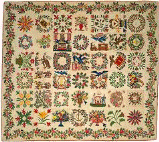Textile Society of America

Textile Society of America: Symposium Proceedings
Date of this Version
9-2012
Document Type
Article
Citation
Published in Textiles and Politics: Textile Society of America 13th Biennial Symposium Proceedings, Washington, DC, September 18- September 22, 2012.
Abstract
Modern production, whether of textiles, art, or ideas, encourages sameness, speed, efficiency, and mediocrity. Slow Cloth is a philosophy that returns meaning to making, whether the making is by hand or machine, is an individual artistic enterprise or a commercial endeavor, is a means for cultural expression in a community or a means for personal exploration. Influenced by the Slow Food movement, there are several textile-related practitioners and organizations now claiming the slow descriptive, yet few have articulated a framework or reference for what slow means. In the context of my definition, which I began conceiving and writing about in 2007, slow is far more than the time it takes to complete something. Its qualities connect us deeply to the past and the future, to tradition and to a sustainable future, while informing us in the present. Slow Cloth is not a project or a technique; it's a focus on process, quality, skill, mastery, joy, community, sustainability, contemplation, and preserving tradition while honoring innovation and expression. This approach lends itself naturally to weaving, knitting, sewing, embroidery, quilting, fashion design, textile design, rugmaking, beadwork, or any other form of working with textiles. Slow Cloth embraces related ideas of slow fashion, slow craft, and a sustainable approach to life. This paper explores the qualities encompassed by the concept of Slow Cloth that give meaning and relevance to working with textiles and fiber in the twenty-first century.


Comments
Copyright 2012 by the author(s).